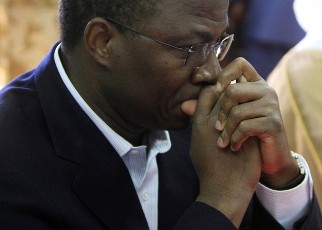African Union makes unusual criticism of Darfur joint mediator
April 9, 2011 (KHARTOUM) – The African Union (AU) on Friday directed rare criticism at the Joint UN-AU chief mediator for Darfur Dijibril Bassole saying that he is working solo in his efforts to mediate an end to eight years conflict in Sudan’ s western region.

Mbeki had previously presided over a panel that was formed in 2009 to formulate a solution package for Darfur that harmonizes peace, justice and reconciliation. The AUHIP was established for the purpose of executing the recommendations he came up with.
But Darfur rebel groups rejected any dealings with Mbeki who they believe is biased in favor of the Sudanese government that is dominated by the National Congress Party (NCP). The view is also shared in large part by Northern Sudanese opposition parties.
Mbeki and Bassole have been engaged in a behind the scene struggle to assert control over the Darfur peace efforts that are now centered around negotiations between Khartoum and rebel movements in the Arab Gulf state of Qatar.
But over the last year the former South African president has shifted focus away from Darfur and instead concentrated efforts on the implementation of the Comprehensive Peace Agreement (CPA) that ended the war between North and South Sudan.
In a progress report submitted to the AU last November, Mbeki admitted that his panel has met little success in carrying out its core mandate with regard to Darfur.
“In the twelve months since the completion of the AUPD report and the acceptance of its recommendations as AU policy, the implementation of those recommendations has been rather disappointing. On the key dimensions of justice and reconciliation, security, and the peace process and political process, substantive progress has been little than I had hoped,” the report reads.
He also appeared to take a direct hit at Bassole’s strategy with regard to the peace process.
“While the AU-UN Joint Chief Mediator has made efforts to involve Darfurian civil society in the peace talks, his effort has, to date, been purely consultative, selective and ad hoc. This has had the unfortunate result of becoming an issue within Darfur itself. And by limiting the talks to the armed groups, this process has empowered the armed movements to act as spoilers if they so wish, and the two most significant movements, the JEM and the SLM-Abdul-Wahid, have refused to participate in the Doha talks, rendering any agreement that are signed moot”.
The AU today decided to throw its full weight behind Mbeki in its statement today saying that it has “repeatedly stressed the need for the Joint Chief Mediator to liaise closely with the AUHIP and coordinate his efforts and initiative with the Panel, especially those that could affect the other tracks, including extending the deadline for the completion of the Doha process”.
“[The] Council regrets that such coordination has not taken place and that, as a consequence, the necessary coordination and harmonization between the Doha process and the DPP and other AU policies, do not yet exist,”.
The AU said it requested the commission to instruct Bassole “to consult with it and the AUHIP, before taking any further decisions, especially those relating to any extension of the Doha peace process”.
Bassole was asked to report on ” his activities and any future plans by 30 April 2011″.
Mbeki supports a plan formulated by Khartoum to “domesticate” efforts to resolve Darfur conflict though promoting dialogue among local actors from states governments, tribal leaders, civil society and IDPs. It also plans to establish security and support the return of displaced persons besides recovery and development projects there.
The government’s strategy is founded on the conviction that the rebel groups have become an obstacle to end the conflict. Ghazi Saleh Al-Deen, presidential adviser tasked with the file, considers also that the rebels distorted the origins of the conflict which had been disputes over pastures and land between cattle herders and farmers.
Sudan has been seeking to force the mediation team to set a firm deadline to end the Darfur talks hosted by the Arab Gulf state of Qatar. At one point Sudanese president Omer Hassan Al-Bashir ordered the government team to pull out from Doha unless an agreement is signed by end of December 2010. However, Bashir later reversed his decision.
(ST)

Stephen Gatloth K
African Union makes unusual criticism of Darfur joint mediator
Only to the article,Gatloth Gai in Bentiu.
African Union are right to critise the Darfur Peace.It has became a playing ball without goal.